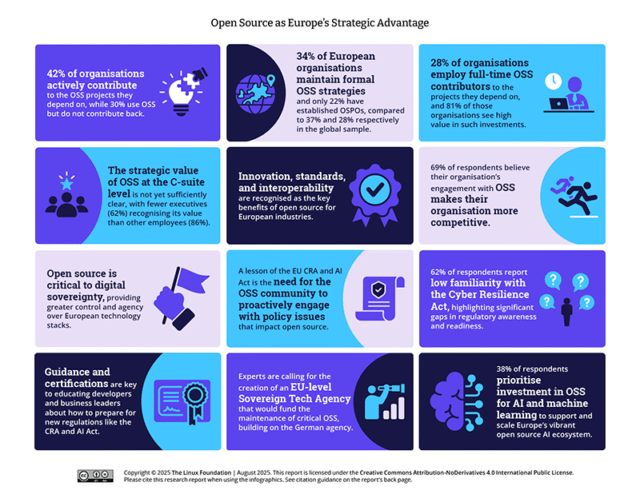Linux Foundation warns Europe risks falling behind without stronger open source strategy

The Linux Foundation has released the 2025 World of Open Source Europe Report, describing open source as a strategic advantage for Europe but warning that a lack of cohesive strategy, leadership buy-in, and policy alignment could hold the continent back. The report, presented at the Open Source Summit Europe, draws on insights from more than 300 IT leaders.
The report found that open source is not just widely adopted but has become essential to Europe’s digital sovereignty. Despite this, the study warns that without deeper investment, stronger executive commitment, and policy frameworks that encourage innovation, Europe risks falling short of its potential to lead in global open innovation.
SEE ALSO: CachyOS Linux update delivers speed, security and reliability improvements
"With evolving European policies and regulations, open source communities and ecosystems face a critical moment of transformation," said Gabriele Columbro, general manager of Linux Foundation Europe.
"The 2025 World of Open Source Europe report reaffirms that European public and private sectors overwhelmingly recognize the value of open source -- not only as a vehicle for innovation and vendor independence, but as a foundation for digital sovereignty and economic opportunity. However, without matching strategic investment, C-level commitment and an entrepreneurial friendly climate, Europe risks missing the opportunity to leverage the global digital commons as the most powerful tool to achieve digital autonomy and compete in the global technology landscape."
Open source adoption
Adoption levels across Europe are high. Operating systems rank as the most used open source technology at 64 percent, followed by cloud and container technologies at 55 percent, web and application development at 54 percent, and AI and machine learning at 41 percent.
More than 90 percent of organizations reported sustained or increased value from open source, indicating that the focus now must shift from simply adopting tools to achieving operational excellence.
The survey said that 75 percent of respondents believe open source produces higher quality software, while 69 percent say it improves competitiveness.
Productivity gains are viewed as the top benefit by 63 percent of respondents, followed by reduced vendor lock-in at 62 percent and lower software ownership costs at 58 percent.
Looking ahead, 58 percent of organizations say innovation will benefit most from increased investment, with 38 percent prioritizing AI and machine learning as an area for support.
The geopolitical environment is also reshaping perceptions. Open source has moved from being viewed as a technical choice to being seen as a strategic lever for sovereignty.
Some experts are calling for the creation of an EU-level Sovereign Tech Agency to fund the maintenance of critical open source software. Updates to the Cyber Resiliency Act and the AI Act, already demonstrate the role regulation plays in balancing innovation with responsibility.
"The benefits of open source include standardization, collaborative and community-driven innovation, cost-effectiveness, faster time to market via accelerated deployment, and it also provides an answer to the geopolitical challenges that we are facing," said Philippe Ensarguet, vice president of engineering at Orange and board member at Linux Foundation Europe. "If you rely on specific vendors, you could be at risk and one way to mitigate this is to focus on open source."
Despite high adoption, gaps remain in how organizations approach open source strategically. Only 34 percent of European organizations have a formal open source strategy and just 22 percent have established open source program offices. Both numbers are under global averages.
Engagement at the executive level also lags, with fewer C-level leaders recognizing the long-term value of open source compared to their staff who directly implement it.
"The responses in the survey clearly show that Europe's open source ecosystem is rich with talent and technical adoption, but it is still maturing in strategic engagement," said Hilary Carter, senior vice president of research at the Linux Foundation.
"Europe's technological leadership and sustained innovation depend on closing this maturity gap with intentional, well-resourced action and top-down support for open source software."
The full 2025 World of Open Source Europe Report can be found here.
What do you think about Europe’s open source strategy? Let us know in the comments.

